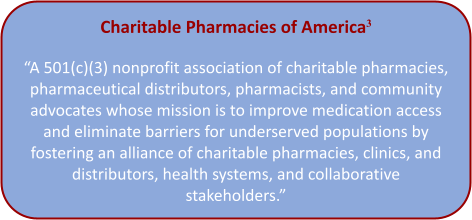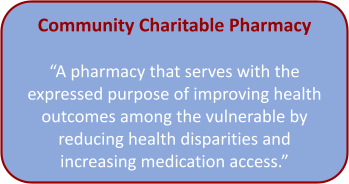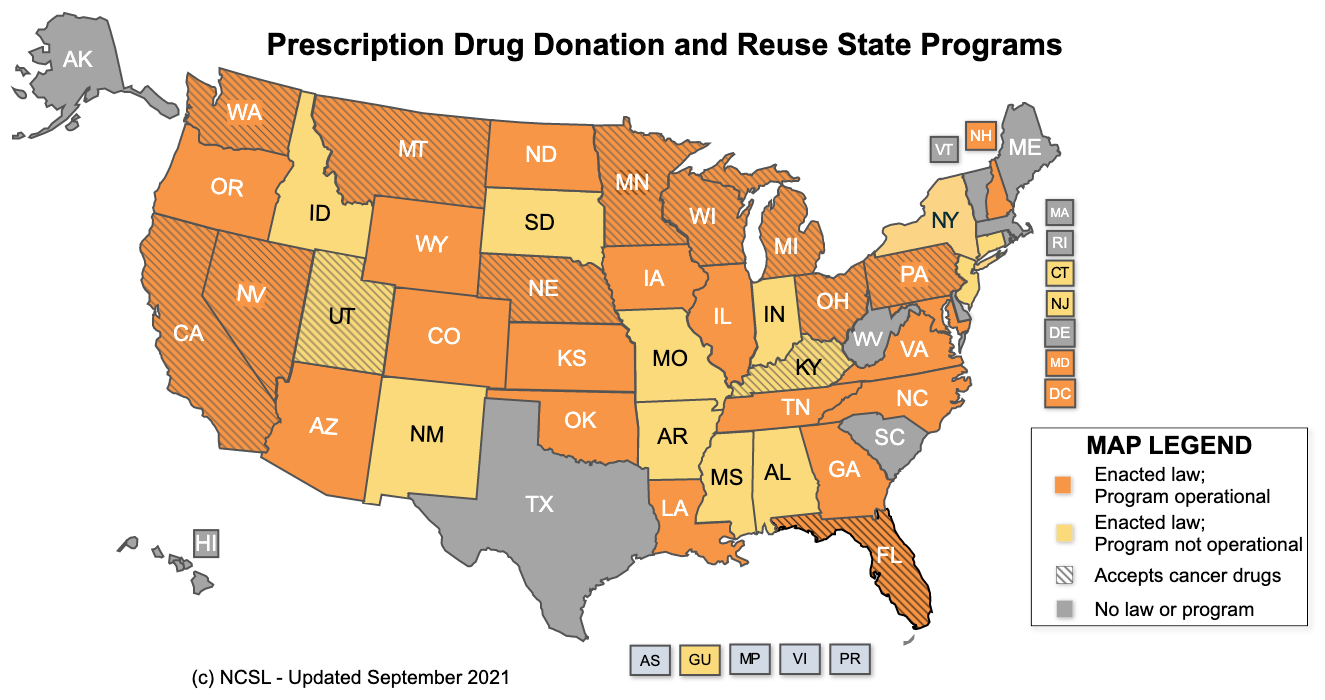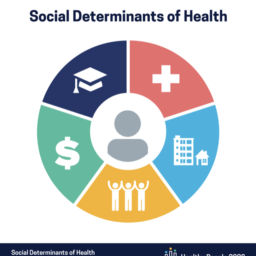Tarik Brakta, 2023 PharmD Candidate
Belmont University College of Pharmacy
The uninsured population in America has been on a steady decline, yet today around 1 in 10 Americans do not have healthcare coverage. According to the 2021 National Center for Health Statistics, approximately 8.8 – 9.5 percent, or 26 – 31 million people, are uninsured2. Non-profit organizations such as charitable pharmacies are vital centers of assistance for those struggling to obtain their medications and are strategic in providing care to the uninsured.
Charitable pharmacies spread a wide medication safety-net for patients who are not able to purchase their medications by making prescription drugs more affordable. While there are many charitable pharmacies nationwide, the phrase “charitable pharmacy” has not been universally defined. Some pharmacy state boards and the national organization Charitable Pharmacies of America (CRxA) offer definitions. Figure 1 shows how CRxA defines what a community charitable pharmacy is.
https://www.charitypharmacy.org/about/what-is-a-charitable-pharmacy/
![]()

![]()
 Figure 1
Figure 1
A review of state board of pharmacy websites shows that some pharmacy state boards have passed statutes, regulations, or rules establishing what a charitable pharmacy is and how they should be regulated. While not all state pharmacy boards specifically assert what a charitable pharmacy is and how they should work, the few that do shed light on what a charitable pharmacy is and how they should operate. Table 1 shows the different states that have regulations and statutes specific to charitable pharmacies.
Table 1
For example, West Virginia’s state board of pharmacy defines a charitable clinic pharmacy as “a clinic or facility organized as a not-for-profit corporation that offers pharmaceutical care and dispenses prescriptions free of charge to appropriately screened qualified patients.” Most pharmacy state boards in Table 1 have the same definition as West Virginia when defining what a charitable pharmacy is but a few have some slight differences such as Oregon which identifies a charitable pharmacy as “a facility with the sole purpose of receiving and distributing donated drugs.”6-17
| Charitable Pharmacy Statutes, Regulation, and Rules
Differences and Similarities3 |
|
|---|---|
| Differences | Similarities |
| Eligibility requirements for patients and donors. | Pharmacists are required to check all donated medications before dispensing. |
| Pharmacy dispensing fees. | Cannot accept donated controlled drugs. |
| Oversight. | Prohibit dispensing of controlled, expired and unsealed drugs. |
| Protocols and requirements for transferring, storing, and repackaging donated drugs. | All donated drugs must have expiration dates on label when dispensed. |
| Types of drugs that are accepted for dispensing. | The selling or reselling of donated medications is prohibited. |
An example of a charitable pharmacy is West Virginia RX (WVRX), a charitable community pharmacy that offers mail order service for its eligible patients who are uninsured and between 138% to 250% of the Federal Poverty Level (FPL) for all West Virginians. Seniors who have difficulty purchasing medications after reaching the donut-hole are also eligible for WVRX assistance by applying for LIS (Low Income Subsidy) and being eligible through patient assistance applications. WVRx gets its medications from its pharmaceutical partners and funding from donors all across the US.18
When discussing charitable pharmacies, not-for-profit organizations and prescription drug repository programs should be addressed as well since they offer support to charitable pharmacies. Some not-for-profit organizations like the Dispensary of Hope are distributors that are partnered with multiple manufacturers who either send in their excess medications, or donate regularly. In turn the Dispensary of Hope receives, labels, and delivers the medications to all partnered nonprofit health systems, clinics, and charitable pharmacies who then dispense to patients who meet the eligibility requirements; being uninsured and at or below the 300% FPL.19
State prescriptions drug repository programs allow patients/facilities to donate their unused drugs to an institution managed by the state or partnered with the state. Many of these programs have their own charitable pharmacies for prescription distribution. For example,. SafenetRX in Iowa, GoodPill in Georgia, and Wyoming with its own state run program. Since 2021 around 40 states including the District of Columbia have passed legislation allowing for the establishment of prescription drug repository programs in a limited (specific drugs only, i.e. cancer) or full capacity. However, it is not necessary for states to have a prescription drug repository program to house an operating charitable pharmacy.19

https://www.ncsl.org/research/health/state-prescription-drug-return-reuse-and-recycling.aspx
Charitable pharmacies are a necessary and effective framework which assists patients who fall through the cracks of America’s healthcare system. Their impact can be felt from the patient’s ability to follow their physician’s therapeutic plan to reducing health care costs.20 A charitable pharmacy is a pharmacy whose purpose is to improve healthcare outcomes by providing access to care and medications to those underserved within the community. While these pharmacies may come in many forms such as mail order, clinical, or community pharmacies, they share a common goal: providing care to those who most need it.
References:
- Rome BN, Egilman AC, Kesselheim AS. Trends in Prescription Drug Launch Prices, 2008-2021. JAMA. 2022;327(21):2145-2147. doi: 10.1001/jama.2022.5542
- Cohen RA and Terlizzi EP. Health insurance coverage: Early release of quarterly estimates from the National Health Interview Survey, April 2019–June 2020. National Center for Health Statistics. February 2021. https://www.cdc.gov/nchs/nhis/releases.htm.
- What is a charitable pharmacy? Charitable Pharmacies of America. Accessed August 16, 2022. https://www.charitypharmacy.org/about/what-is-a-charitable-pharmacy/
- Charitable Clinic Permit. Arkansas Rule 070.00.05-001 – Regulation 04-07. Accessed August 16, 2022. https://www.pharmacyboard.arkansas.gov/wp-content/uploads/2022/02/Merged-Lawbook-2022-Feb-14.pdf
- Charitable Pharmacy.Louisiana § LIII-21 Charitable. Accessed August 16, 2022. http://www.ladental.org/images/stories/Online-CE/LABoard-RxLawsandRules-18.pdf
- Charitable Pharmacy Permits. Mississippi Article XLVI. Accessed August 19, 2022. https://sos.ms.gov/ACProposed/00020448b.pdf
- Standards of Operation for a Class Q: Charitable Pharmacy. Missouri Rule 20 CSR 2220-2.685. Accessed August 19, 2022. https://www.sos.mo.gov/cmsimages/adrules/csr/current/20csr/20c2220-2.pdf
- Special Limited Pharmacy Permit: Charitable Kentucky Title 201 KAR 2:240. Accessed August 16, 2022. https://apps.legislature.ky.gov/law/kar/titles/201/002/240/
- Charitable Pharmacies. Oregon ORS 689.770-780. Accessed August 16, 2022. https://oregon.public.law/statutes/ors_689.770
- Charitable providers. New Hampshire Part Ph 1409. Accessed August 16, 2022. https://www.oplc.nh.gov/sites/g/files/ehbemt441/files/inline-documents/sonh/nh-phcy-law-rule-book-10-29-19.pdf
- Charitable Pharmacies. Ohio Rule 4729:5-7. Accessed August 16, 2022. https://codes.ohio.gov/ohio-administrative-code/chapter-4729:5-7#:~:text=Rule%204729%3A5%2D7%2D05%20%7C%20Dispensing%20a%20sample,drug%20by%20a%20charitable%20pharmacy.&text=(A)%20A%20pharmacist%20in%20a,sample%20drug%20to%20a%20patient.
- Charitable Clinic Pharmacies. Oklahoma Title 535:15-11-1. Accessed August 16, 2022. https://www.ok.gov/pharmacy/documents/2021%20Rule%20Book.pdf
- Charitable Clinic Pharmacy. Tennessee Chapter 1140-12. Accessed August 16, 2022. https://publications.tnsosfiles.com/rules/1140/1140-12.pdf
- Charitable Prescription Drug Recycling Act. Utah Section 58-17b-9. Accessed August 16, 2022. https://le.utah.gov/xcode/Title58/Chapter17B/58-17b-P9.html
- Regulation of Charitable Pharmacies. West Virginia §15-13. Accessed August 16, 2022. https://www.wvbop.com/www/download_resource.asp?id=362
- Free and Charitable Clinics. Wisconsin Section 1. 450.01 (11o). Accessed August 16, 2022. https://docs.legis.wisconsin.gov/statutes/statutes/450/01/11o/c
- Who qualifies for WVRx medication. West Virginia Rx. Accessed August 16, 2022. http://www.wvrx.org/faq.
- About Us. Dispensary of Hope. Accessed August 22, 2022. https://www.dispensaryofhope.org/about-us
- State Prescription Drug Repository Programs. NCSL. Accessed August 16, 2022. https://www.ncsl.org/research/health/state-prescription-drug-return-reuse-and-recycling.aspx
- 2022 Study Reveals Better Health Outcomes and Significant Cost Savings. Dispensary of Hope. August 25, 2022. Accessed August 27, 2022. https://www.dispensaryofhope.org/news/posts/2022-study-reveals-better-health-outcomes-and-significant-cost-savings


